
In the world of logistics and supply chains, the condition of products during transportation is crucial for ensuring they reach their destination in optimal condition. One of the most effective solutions to ensure product quality, especially for perishable goods, is the use of ventilated bulk bags. These specially designed packaging bags help mitigate the risks associated with spoilage during shipment by providing proper ventilation to the contents. This article explores how ventilated bulk bags contribute to reducing product spoilage and why businesses should consider them for safer, more efficient transportation.
What Are Ventilated Bulk Bags?
Ventilated bulk bags, often referred to as ventilated FIBC bags (Flexible Intermediate Bulk Containers), are large, durable bags designed for bulk transportation of various products. Unlike traditional bulk bags, these have built-in vents that allow air circulation around the contents, making them ideal for products that require airflow to maintain their quality. They are widely used in the agricultural, food, chemical, and construction industries, especially for goods that can spoil if exposed to excessive moisture, heat, or lack of airflow.
How Ventilated Bulk Bags Prevent Moisture Build-Up
One of the primary causes of spoilage during transportation is the accumulation of moisture. When products are packed in airtight or non-ventilated containers, moisture can build up, especially when the shipment is exposed to fluctuating temperatures. This trapped moisture creates an ideal environment for mold growth, which can render products unfit for sale. Ventilated bulk bags provide a solution to this problem by allowing air to circulate through the material. This ventilation ensures that moisture does not accumulate inside the bag, significantly reducing the chances of mold growth and other forms of spoilage caused by humidity.
Protecting Agricultural Products with Ventilated Bulk Bags
Agricultural products such as grains, vegetables, and fruits are particularly vulnerable to spoilage during transportation. These products often produce moisture due to respiration or condensation, and without proper ventilation, they are prone to rotting or mold growth. Ventilated bulk bags manufacturer designs often incorporate mesh or perforated panels that allow natural airflow to pass through the bags. This ensures that the produce inside remains cool and dry, significantly extending its shelf life during transport. These bags are an essential tool for farmers and exporters who need to deliver fresh produce to markets without the risk of spoilage.
Preventing Spoilage in Chemical and Pharmaceutical Shipments
While ventilated bulk bags are often associated with agricultural products, they are equally important for the safe transport of chemicals and pharmaceuticals. Many chemical products, especially those in powder or granular form, are sensitive to moisture. The presence of moisture can cause chemical reactions, clumping, or degradation of the product. Similarly, pharmaceutical raw materials must be protected from contamination or degradation, which could occur from improper handling during shipment. By allowing airflow, ventilated FIBC bags prevent moisture accumulation and maintain the integrity of the product, ensuring it arrives at its destination in the same condition it was packed.
Reducing the Risk of Temperature-Related Spoilage
In addition to moisture, temperature fluctuations can also lead to spoilage. Products such as food, chemicals, and certain pharmaceuticals are sensitive to changes in temperature. If these products get too hot or cold, they can deteriorate, lose their potency, or become unsafe for use. Ventilated bulk bags help reduce the risk of temperature-related spoilage by promoting airflow, which regulates the internal temperature of the bag. This feature is particularly valuable when transporting products in environments where external temperatures can fluctuate significantly, such as long-haul shipments or transportation in areas with extreme climates.
Ventilated Bulk Bags for Sensitive Food Products
Food products, especially those that are organic or perishable, need to be transported in a manner that minimizes the risk of spoilage. When packed in ventilated bulk bags, food items like grains, seeds, nuts, and dried fruits benefit from consistent airflow, which helps to prevent moisture build-up and preserves their freshness. The bags also reduce the risk of contamination from external elements such as dirt, insects, or pests. For example, exporters of dry fruits often rely on ventilated bulk bags supplier to ensure that their products reach international markets without spoilage or damage from poor air circulation.
Why Businesses Should Choose Ventilated Bulk Bags for Long-Distance Shipping
For businesses involved in the global shipment of goods, especially perishable items, the stakes are high when it comes to product spoilage. A compromised shipment can lead to significant financial losses and damage to a company’s reputation. By choosing ventilated FIBC bags, companies can ensure that their products remain in top condition during transit. These bags are specifically designed to protect goods from environmental factors such as heat, humidity, and contamination. Their ability to allow air to circulate around the contents reduces the chances of spoilage, making them an essential choice for long-distance shipping.
The Role of Ventilated Bulk Bags in Sustainability
In today’s market, sustainability is a key consideration for businesses and consumers alike. Companies are increasingly looking for eco-friendly packaging solutions that minimize waste and environmental impact. Ventilated bulk bags not only provide functional benefits for product protection but also contribute to sustainability efforts. These bags are reusable, recyclable, and often made from durable materials like polypropylene, which reduces the need for single-use packaging. By opting for Ventilated FIBC bags, businesses can contribute to a circular economy while ensuring that their products are safely transported.
How to Choose the Right Ventilated Bulk Bag Supplier
When selecting a ventilated bulk bag supplier, it is important to consider the quality of the bags, the materials used, and the supplier’s experience in manufacturing custom solutions. A reliable supplier should be able to offer bags with optimal ventilation, tailored to the specific needs of your products. Additionally, look for suppliers who can provide bags that meet industry standards and certifications, ensuring that the bags are durable and capable of handling the weight and nature of the goods being transported. Choosing the right supplier ensures that the bags will offer the necessary protection during shipment and contribute to reducing spoilage.
Cost-Effectiveness of Ventilated Bulk Bags
Although the initial cost ofventilated bulk bags may be higher than traditional packaging methods, their long-term benefits far outweigh the initial investment. The ability to reduce spoilage, prevent product loss, and maintain quality during shipment leads to significant cost savings for businesses. Products are less likely to be rejected or need to be repackaged, and companies can avoid losses due to spoiled goods. Furthermore, the reusable nature of these bags means that businesses can use them multiple times, further enhancing their cost-effectiveness over time.
Conclusion: Ensuring Safe and Efficient Shipments with Ventilated Bulk Bags
In conclusion, ventilated bulk bags play a vital role in reducing product spoilage during shipment. Their ability to promote airflow, prevent moisture build-up, and protect against temperature fluctuations ensures that products remain in good condition throughout their journey. Whether shipping agricultural produce, chemicals, pharmaceuticals, or food products, these bags provide a reliable and cost-effective solution for businesses. By partnering with a trusted Ventilated bulk bag supplier or ventilated bulk bag manufacturer, businesses can safeguard their products, reduce losses, and enhance customer satisfaction.
Frequently Asked Questions (FAQs)
1. Are ventilated bulk bags cost-effective?
Yes, ventilated bulk bags are cost-effective in the long run. Though their initial cost may be higher than other forms of packaging, their ability to reduce spoilage, prevent product loss, and be reused multiple times makes them a valuable investment. Businesses can save money on repackaging and product loss, leading to a lower total cost over time.
2. How do I clean and store ventilated bulk bags for reuse?
Cleaning ventilated bulk bags typically involves wiping them down with a damp cloth or using a mild detergent to remove any residue. For larger, more stubborn stains, they can be washed using a low-pressure machine wash. After cleaning, the bags should be stored in a dry, cool area away from direct sunlight to preserve their durability.
3. Can ventilated bulk bags handle heavy weights?
Yes, ventilated bulk bags are designed to handle heavy loads. They are made from strong materials like polypropylene and come in various strength ratings to accommodate different weight requirements. Always check the manufacturer’s specifications to ensure the bag is suitable for the weight and nature of your product.

0 Comments
Post Comment